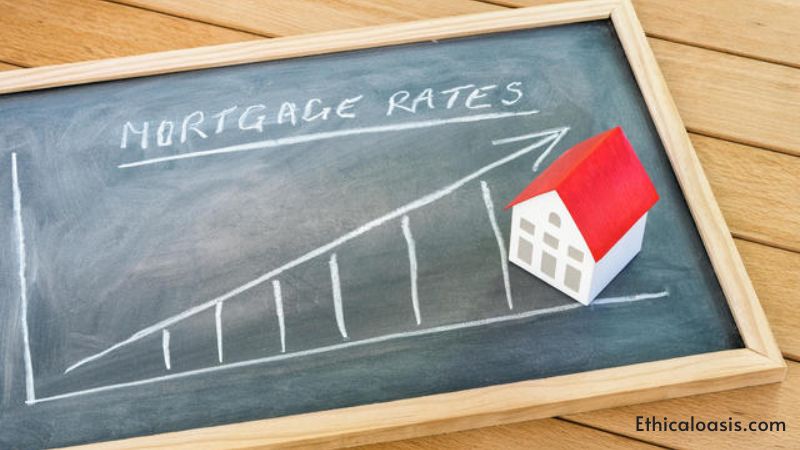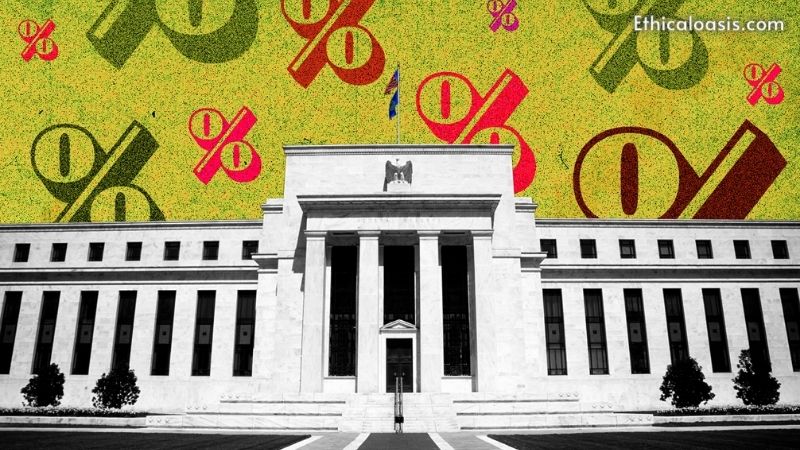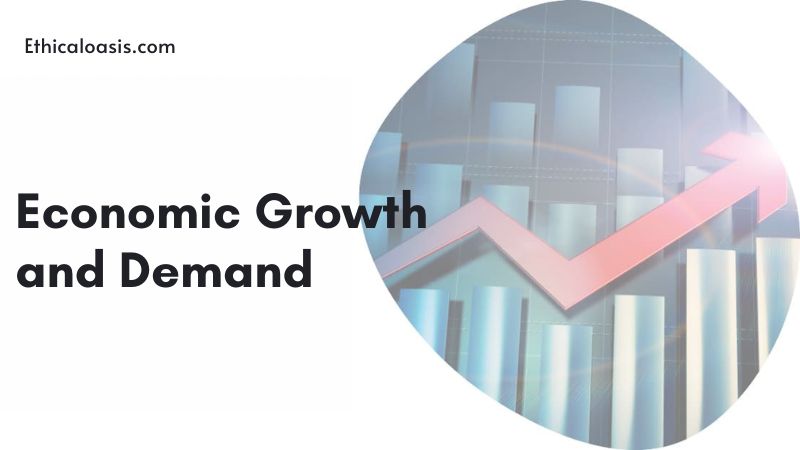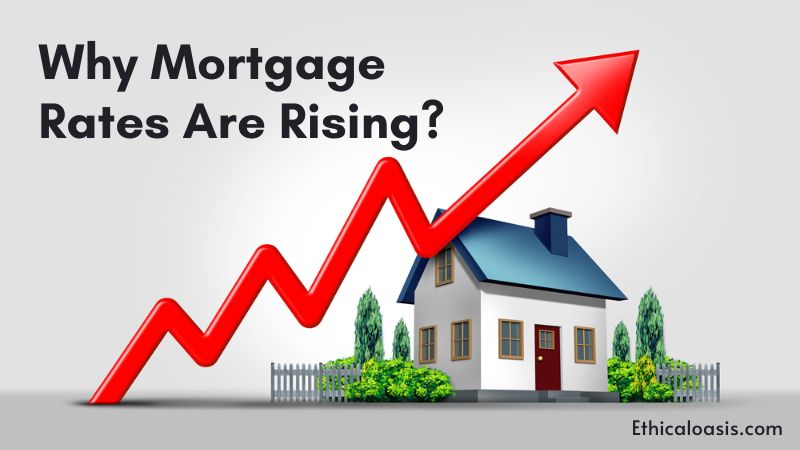In recent times, prospective homeowners and real estate investors have faced a significant challenge: rising mortgage rates. This phenomenon, influenced by a variety of economic factors, has critical implications for both the housing market and broader economy. In this article, Ethicaloasis will explore why mortgage rates are rising by delving into the intricate dynamics of inflation, Federal Reserve policies, economic growth, bond market influences, market expectations, and global economic factors. Understanding these elements will provide a comprehensive view of the factors at play.
Why Mortgage Rates Are Rising? Inflation and Its Role
One of the primary reasons why mortgage rates are rising is inflation. Inflation refers to the general increase in prices of goods and services over time, eroding the purchasing power of money. When inflation rates are high, the cost of living increases, which often leads to a rise in interest rates, including mortgage rates. Central banks, like the Federal Reserve, combat high inflation by raising interest rates to make borrowing more expensive, thus cooling off economic activity. This approach helps to bring inflation under control but has the side effect of increasing mortgage rates.

For instance, if the inflation rate climbs from 2% to 5%, the Federal Reserve may decide to increase its benchmark interest rate. This move directly impacts mortgage rates, making borrowing more expensive for homebuyers. Consequently, monthly mortgage payments rise, affecting affordability for many potential homeowners. Hence, inflation is a crucial factor in understanding why mortgage rates are rising.
Federal Reserve Policies
Another significant reason why mortgage rates are rising is the policy decisions made by the Federal Reserve. The Fed uses monetary policy tools, such as adjusting the federal funds rate, to influence the economy. When the Fed anticipates or observes high inflation or robust economic growth, it may raise interest rates to prevent the economy from overheating. These higher interest rates filter through the financial system, ultimately leading to higher mortgage rates.

For example, in response to persistent inflation, the Federal Reserve may decide to raise the federal funds rate. This action makes borrowing more expensive across the board, including for mortgages. As a result, lenders increase the rates they charge for home loans. This policy mechanism is a direct cause of why mortgage rates are rising, as higher benchmark rates translate into higher costs for borrowers.
Economic Growth and Demand
Strong economic growth also contributes to why mortgage rates are rising. When the economy is growing rapidly, consumer confidence tends to increase, leading to higher spending and borrowing. This heightened demand for credit puts upward pressure on interest rates, including those for mortgages. Lenders respond to increased demand by raising rates to balance supply and demand.
For instance, during periods of economic expansion, businesses invest more, consumers spend more, and the demand for housing often increases. This robust economic activity can lead to higher inflation expectations, prompting the Federal Reserve to raise interest rates. Consequently, mortgage rates rise as lenders adjust to the new cost of borrowing. Therefore, strong economic growth is a pivotal factor in the rising mortgage rates observed in the market.

Bond Market Dynamics
The bond market plays a crucial role in determining why mortgage rates are rising. Mortgage rates are closely tied to the yields on long-term government bonds, particularly the 10-year Treasury note. When investors expect higher inflation or stronger economic growth, they demand higher yields on these bonds to compensate for the increased risk. As a result, mortgage rates, which are influenced by these yields, also rise.
For example, if the yield on the 10-year Treasury note increases due to higher inflation expectations, mortgage rates are likely to follow suit. Investors seek higher returns to offset the anticipated decrease in purchasing power due to inflation, leading to higher borrowing costs for consumers. This relationship between bond yields and mortgage rates is a key reason why mortgage rates are rising in tandem with changes in the bond market.
Market Expectations
Market expectations significantly influence why mortgage rates are rising. Investors’ perceptions of future economic conditions, including inflation and Federal Reserve policy, can lead to changes in mortgage rates. If investors believe that inflation will remain high or that the Fed will continue to raise interest rates, they may demand higher yields on bonds, which in turn pushes mortgage rates higher.
For instance, if market participants anticipate that the Federal Reserve will implement several rate hikes to combat inflation, they may adjust their portfolios accordingly, leading to higher bond yields and mortgage rates. These expectations can become self-fulfilling prophecies, as higher anticipated rates lead to actual increases in borrowing costs. Therefore, market expectations are a significant factor in understanding why mortgage rates are rising.
Global Economic Factors
Global economic factors also play a role in why mortgage rates are rising. Events such as geopolitical instability, economic crises in other countries, and shifts in global trade dynamics can impact U.S. mortgage rates. These global factors influence investor behavior, leading to changes in demand for U.S. bonds and affecting domestic interest rates.
For example, geopolitical tensions or economic slowdowns in major economies like China or the European Union can lead investors to seek safer investments, such as U.S. Treasuries. This increased demand for U.S. bonds can temporarily lower yields; however, if global inflationary pressures rise or international central banks increase rates, these effects can reverse, contributing to higher U.S. mortgage rates. Thus, global economic factors are intertwined with why mortgage rates are rising.
Conclusion
In conclusion, understanding why mortgage rates are rising involves examining a complex interplay of various economic factors. Inflation, Federal Reserve policies, strong economic growth, bond market dynamics, market expectations, and global economic factors all contribute to the trend of increasing mortgage rates. Each of these elements influences the cost of borrowing, impacting potential homeowners and the broader real estate market.
As inflation rates climb, the Federal Reserve raises interest rates to manage economic overheating, leading to higher mortgage rates. Economic growth boosts demand for credit, putting upward pressure on rates. The bond market responds to inflation expectations, affecting mortgage costs. Market expectations and global economic events further shape the landscape, influencing why mortgage rates are rising.
Understanding these dynamics is crucial for anyone involved in the housing market, from prospective buyers to policymakers. By recognizing the factors driving mortgage rates higher, individuals can make more informed decisions about buying homes, refinancing existing mortgages, and navigating the complex economic environment. As the economy continues to evolve, staying informed about these key influences will be essential for adapting to the changing landscape of mortgage rates.

